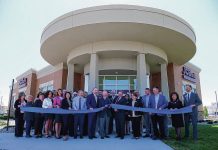Life was dark for one drug addict five years ago.
Kristie Outcalt, who was 35 at the time, had spent the past 20 years of her life addicted to meth, homeless on the streets of Martinsville and, for one year, in jail. She had lost custody of her children, and it seemed to her like there was no way out of a downward spiral.
But then Outcalt discovered Centerstone, a national mental health and substance abuse recovery program with offices across Indiana, including in Columbus and Outcalt’s hometown of Martinsville.
The certified counselors and recovery specialists at Centerstone helped Outcalt regain control of her life. Soon, she will celebrate the four-year anniversary of her sobriety and the end of her homelessness.
“Centerstone gave me a chance when I didn’t think anyone else would,” she said.
Today, Outcalt is giving back to the organization that helped her get her life back by working as a peer recovery specialist for a new Centerstone program designed to help the chronically homeless across the state, including in Bartholomew County.
A three-year, $1.2 million federal grant is enabling Centerstone to launch the Centerstone Connections program, designed to address the underlying causes of homelessness.
The Centerstone Connections grant will help chronically homeless residents in Bartholomew, Brown, Decatur, Fayette, Johnson, Monroe, Morgan, Rush, Shelby and Wayne counties, said Brian Meyer, the program’s director.
Initial work through the program began in late October in Monroe County, and the Columbus initiative began March 28, Meyer said.
“Our mission is to start working with them to identify the issues that keep them from securing and sustaining permanent housing,” he said.
Centerstone Connections participants must meet the federal definition of chronic homelessness, which is four separate time periods or at least one full year without a permanent home, Meyer said.
The only exception is for veterans, who can participate in the program even if they are not to the point of chronic homelessness.
“We’ll help them, regardless,” Meyer said.
Several factors can lead to chronic homelessness, but the most common causes are mental illness and substance abuse, which often are co-occurring conditions, Meyer said. Participants also must be suffering from those issues to join Centerstone Connections.
During her own journey to recovery, Outcalt said Centerstone paid for her to complete programs to become a certified community health worker and recovery specialist.
That education is enabling her to serve as peer recovery specialist for Centerstone Connections in Bartholomew, Brown, Monroe and Morgan counties, a role that will allow her to use her own story to show those still struggling with homelessness and addictions that their lives can get better.
“I just have that ‘If I can do it, you can do it’ attitude,” Outcalt said.
The federal grant allows Centerstone Connections to address the needs of 200 people total in the 10-county area, Meyer said.
“There’s a lot more (homeless) people than we’re going to be able to help,” he said. “When you provide the intensive services to the chronically homeless, you’re serving a lower number of people.”
But the remaining homeless population in Columbus still has an opportunity to find help through the Columbus Homelessness Outreach Program, or CHOP.
CHOP is a public-private partnership between the city and Centerstone, Love Chapel, Horizon House, Columbus Regional Health Mental Health Services and Ben Jackson, the Columbus Township trustee. It began in 2014 with federal grant funding from a community development block grant. The funds were renewed in December for $23,000.
Although CHOP is limited to the Columbus area, it is able to serve more people than Centerstone Connections, Meyer said.
As Centerstone Connections gains traction in Bartholomew County, leaders of both homeless recovery groups say they hope to coordinate with each other and utilize the resources each program has to offer.
The end goal of both recovery programs is to help homeless residents find and sustain a permanent place to live. Once that happens, Meyer and CHOP Care Coordinator Christy Killmer said they will continue to follow up with their clients to ensure they do not relapse back into the cycle of homelessness.
Outcalt said she knows from personal experience that it can be difficult to break free of the illnesses and addictions that can repeatedly force someone into that cycle.
But she said she also knows that with the right help and influences — such as the staff at Centerstone — anybody can decide to turn their life around and find a new beginning.
“You can change. It’s possible,” Outcalt said. “You have to work for it.”
[sc:pullout-title pullout-title=”How to refer someone to the programs” ][sc:pullout-text-begin]
Referrals to the Columbus Homelessness Outreach Program (CHOP) or Centerstone Connections can come from a variety of places, including non-profit agencies, local law enforcement, the state Department of Corrections or community members. Additionally, Centerstone Connections staffers are committed to going out in the community and finding people in need.
To refer someone to either of the programs, call one of the following organizations:
Centerstone Connections
- Centerstone Columbus, 812-314-3400
CHOP
- Centerstone Columbus
- Love Chapel, 812-372-9421
- Columbus Township Trustees Office, 812-372-8249
[sc:pullout-text-end][sc:pullout-title pullout-title=”About Centerstone program” ][sc:pullout-text-begin]
Centerstone Connections
- Outreach area: Bartholomew, Brown, Decatur, Fayette, Johnson, Monroe, Morgan, Rush, Shelby and Wayne counties
- Target demographic: Chronically homeless — four separate periods or at least one full year of homeless
- Sponsor organization: Centerstone
- Available resources: Housing, mental illness/addiction recovery services, benefits assistance provided by peer recovery specialists and recovery coaches
[sc:pullout-text-end]




